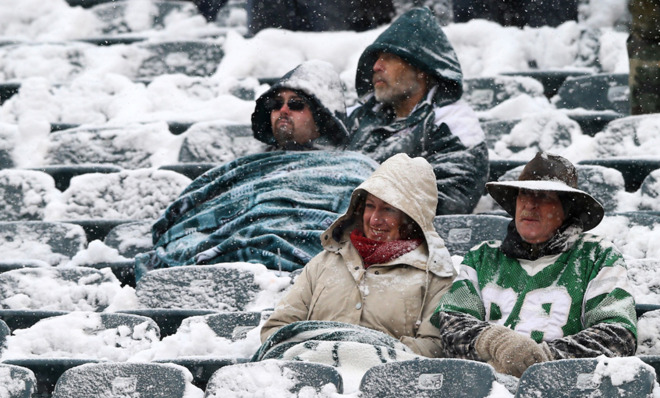33 fascinating things we learned about ourselves from polls this year
Chances are, you think the country is on the wrong track and are worried about terrorist attacks. And there's a 1-in-10 shot you look at your phone during sex.

A free daily email with the biggest news stories of the day – and the best features from TheWeek.com
You are now subscribed
Your newsletter sign-up was successful
How are we feeling?
Pretty glum. In November, 70 percent of Americans said the country was "on the wrong track," the highest number in two years (ABC/The Washington Post), and 42 percent expect the economy to get worse in the next 12 months (NBC/The Wall Street Journal). 54 percent say they've felt little or no economic improvement since the 2008 financial crisis (ABC/The Washington Post), and 29 percent think the economy will never fully recover (Rutgers University). That sense of pessimism extends overseas. 70 percent say the U.S. is losing respect internationally, and 53 percent believe America plays a less important role in the world than a decade ago. 52 percent say the U.S. should mind its own business and try to stay out of other nations' affairs (Pew Research Center).
Who do we blame for America's problems?
The Week
Escape your echo chamber. Get the facts behind the news, plus analysis from multiple perspectives.

Sign up for The Week's Free Newsletters
From our morning news briefing to a weekly Good News Newsletter, get the best of The Week delivered directly to your inbox.
From our morning news briefing to a weekly Good News Newsletter, get the best of The Week delivered directly to your inbox.
Politicians. 59 percent of voters disapprove of President Obama's handling of the economy, and 60 percent don't like how he's dealt with health care (Quinnipiac). Even young Americans are souring on the president, with 54 percent of 18- to 29-year-olds saying they're unhappy with his performance (Harvard University). Voters aren't frustrated with Obama alone — only 9 percent approve of the way Congress is doing its job, the lowest number in 39 years (Gallup), and 60 percent would like to replace every single senator and representative (NBC/The Wall Street Journal). To get better politicians, though, we may need better voters. 55 percent say most Americans are guided by their emotions, not facts, when they vote (Rasmussen).
How has society changed?
We're more open-minded. A record 63 percent say it is "morally acceptable" for unmarried people to have sex, 59 percent have no moral objections to gay relationships, and for the first time a majority of Americans — 58 percent — favor legalizing marijuana (Gallup). But we're troubled by technology's effect on the nation. 59 percent say the internet and social media are making Americans ruder (Weber Shandwick), and 69 percent think we're too distracted by our gadgets (Harris Interactive). Evidence suggests they're right. 49 percent of adults and 43 percent of teenagers admit to texting while driving even though they know it's unsafe (AT&T/USA Today). 33 percent of smartphone owners say they've used their device during a dinner date. 9 percent admit to looking at their phones during sex (Jumio/Harris Interactive).
How do we relax?
A free daily email with the biggest news stories of the day – and the best features from TheWeek.com
We watch a lot of sports. Pro football is by far America's favorite sport, with 48 percent of sports fans saying they closely follow events on the gridiron, compared with 11 percent who are devoted to pro basketball and 7 percent to Major League Baseball (Public Religion Research Institute). 84 percent of football fans say their viewing pleasure hasn't been affected by growing scientific evidence that hard hits can leave players permanently brain damaged (HBO/Marist).
What are we scared of?
A lot. 66 percent worry about a terrorist attack on their community (Reuters/Ipsos), and 55 percent fear that a mass shooting might happen in their area (ABC News/The Washington Post). For many, Washington is what keeps them up nights. 53 percent think the government threatens their personal rights and freedoms (Pew Research Center), while 36 percent of Americans, including 62 percent of Republicans, suspect the Obama administration is secretly plotting to seize everyone's guns (Public Policy Polling). Despite our fear of the feds, 56 percent approve of drone aircraft being used to kill suspected foreign terrorists on U.S. soil (Fox News). But there are limits to the powers we're prepared to grant flying robots. An overwhelming 72 percent oppose using drones to monitor motorists and issue speeding tickets (Monmouth University).
-
 5 blacked out cartoons about the Epstein file redactions
5 blacked out cartoons about the Epstein file redactionsCartoons Artists take on hidden identities, a censored presidential seal, and more
-
 How Democrats are turning DOJ lemons into partisan lemonade
How Democrats are turning DOJ lemons into partisan lemonadeTODAY’S BIG QUESTION As the Trump administration continues to try — and fail — at indicting its political enemies, Democratic lawmakers have begun seizing the moment for themselves
-
 ICE’s new targets post-Minnesota retreat
ICE’s new targets post-Minnesota retreatIn the Spotlight Several cities are reportedly on ICE’s list for immigration crackdowns